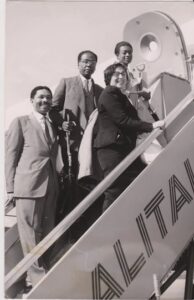
Dorothy Pizer (foreground)
*The birth of Dorothy Pizer is celebrated on July 3, c.1906. She was a white British working-class anti-racist activist, secretary, publishing worker, and collaborator of a Pan-Africanist.
The daughter of a tailor who had left school at 15, Dorothy Pizer grew up in a household without books in London's East End. Since she had been too poor to accept a scholarship, her education was limited. Yet she later learnt stenography, became a business secretary, and became fluent in French. Pizer's brother was a member of the Communist Party of Great Britain (CPGB), and she became involved with the CPGB in the 1930s. Through party contacts, she met George Padmore in 1937, and by the end of World War II, the pair were living together.
She was always treated as Padmore's wife, although they were never formally married, and he had a former wife, Julia Semper. Pizer supported the couple financially as a secretary during the day. She typed the manuscript of C. L. R. James's book World Revolution (1937). Publishing was one of the main strategies adopted by Black intellectuals in challenging the foundations of British colonial rule. Pizer's skills enabled her to play an essential role in this global political struggle. She was praised as a secretary to Padmore, typing his manuscripts, as well as a consummate hostess and an excellent chef for the revolving door of African and West Indian nationalists who came to their home. Yet she was much more than this. Their relationship was both a practical and an intellectual partnership. It was a companionship in which ideas could be debated and strategies worked out.
She transcribed the conversations between Padmore and Nancy Cunard on race relations and decolonization that became their pamphlet The White Man's Duty: An Analysis of the Colonial Question in the Light of the Atlantic Charter (London: W. H. Allen & Co., 1942). In 1946, How Russia Transformed her Colonial Empire was published by Dennis Dobson as a collaboration between Pizer and Padmore, with her name appearing on the title page. From 1941 to 1957, the couple shared a flat at 22 Cranleigh Street in Camden, London. It became a mecca for visiting pan-Africanists and leftists, including Kwame Nkrumah, Eric Williams, Jomo Kenyatta, and Joe Appiah. The couple first met Richard Wright and his wife in 1947, and over the next decade, the couple often visited each other in London and Paris. In 1953, Dorothy persuaded Wright to visit the Gold Coast, where Padmore had already begun advising Kwame Nkrumah on his plans for Ghana's independence.
Pizer herself visited the Gold Coast for the first time in 1954, and in 1957, the couple moved to Ghana permanently as special advisers to Kwame Nkrumah. At the time of Padmore's premature death in 1959, Pizer was visiting W.E.B. Du Bois and his wife Shirley in New York. She returned for her husband's state funeral, and she continued to live in Ghana as an adviser to Nkrumah. She planned but never completed a biography of her Padmore, collecting notes and papers relating to him.
According to historian Leslie James, the unfinished biography of Padmore that C. L. R. James had hoped to write maintained that "Padmore was the man he was because of the tremendous assistance he had from Dorothy." On November 22, 1964, aged 58, she died in Accra from a heart attack. After her death, Nkrumah took some of the papers that she had collected relating to her husband, and the papers subsequently made their way to Howard University.